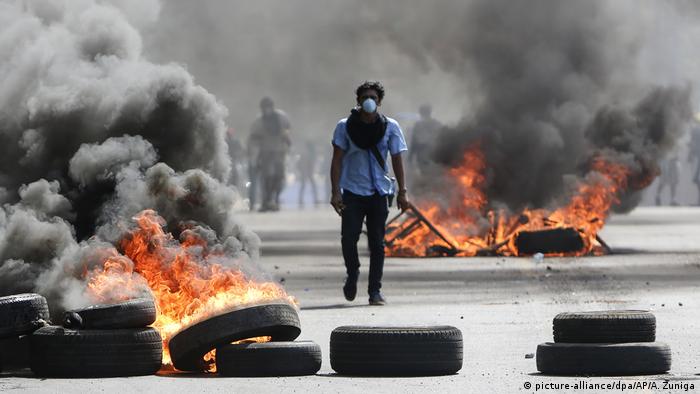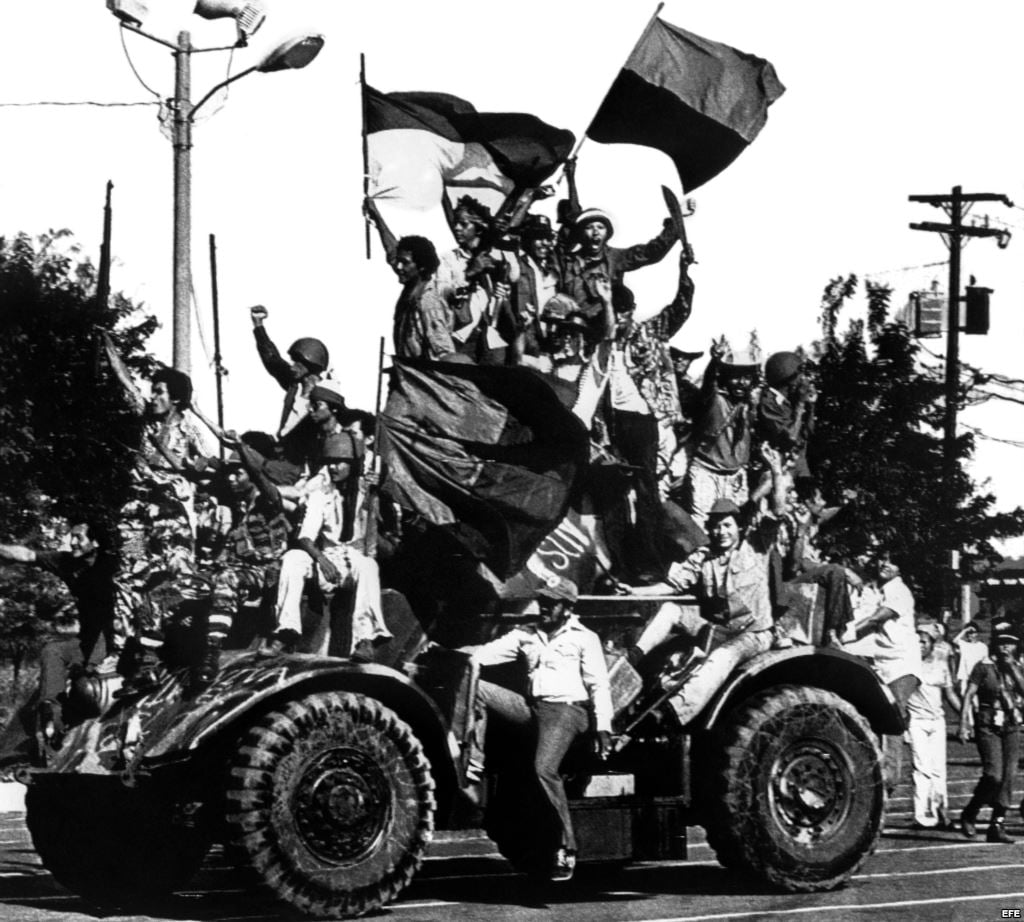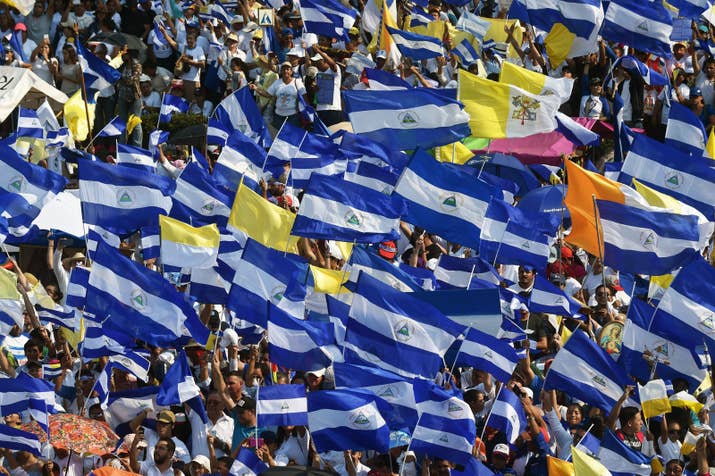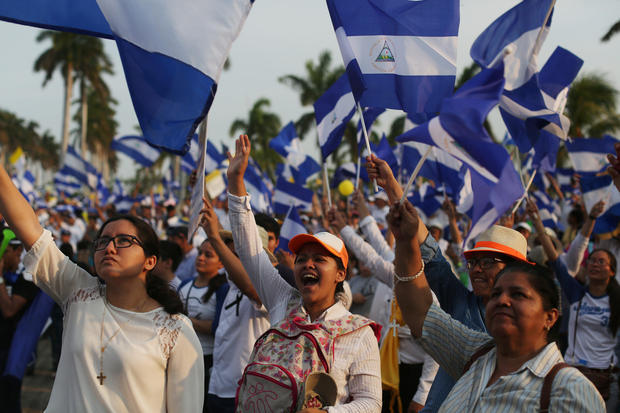
Welcome MyXXFam, it’s ya girl Yesenia Guadalupe! If you’re a long-time reader you already know I’m a Nicamericana (or Nicaraguan-American), with a deep reverence for the motherland, its customs, and its people. If you’re new here, you may or may not know about the country of Nicaragua and its political history, but you might have heard about recent protests that erupted into riots across the country. Today on MyXXFLY, we’re bringing you what you need to know about these incidents, and why you should care.
¡Bienvenido MyXX familia, es tu amiga Yesenia Guadalupe! Si frecuentas nuestra pagina ya sabes que soy Nicamericana, con una profunda reverencia por la madre patria, sus costumbres y su gente. Si eres nuevo aquí, tal vez no conozcas Nicaragua y su historia política, pero es posible que hayas oído sobre las recientes protestas por todo el país. Hoy en MyXXFLY, le presentamos lo que necesita saber sobre estos incidentes y por qué deberías todos estar atentos.

Political History / Historia política
The proud people of Nicaragua are deeply passionate, patriotic, and religious. This combination of traits in its citizens have no doubt contributed to the country’s rich history of heroic revolutionary figures and the despots they challenged. From Augusto Sandino’s fight against U.S. military occupation, to the overthrowing of the Somoza family dynasty by the Sandinista national liberation front, war and political unrest punctuate Nicaragua’s history. Revisiting some key points are important in understanding present day conflicts.
Los orgullosos Nicaragüenses son profundamente apasionados, patrióticos y en gran parte religiosos. Esta combinación en sus ciudadanos sin duda ha contribuido a la rica historia del país, de figuras heroicas revolucionarias y los déspotas que desafiaron. Desde la lucha de Augusto Sandino contra la ocupación militar de los Estados Unidos. Hasta el derrocamiento de la dinastía de la familia Somoza por parte de la frente Sandinista, la guerra y lucha política acentúan la historia de Nicaragua. Revisar algunos puntos clave es importante para entender los conflictos actuales.
The Sandinistas, a marxist and anti-imperialist rebellion, were named after Augusto Sandino. Led by Daniel Ortega who’d been trained in guerrilla warfare by the Castro government, the Sandinistas overthrew the Somoza dynasty in 1979. An overhaul in infrastructure took place, and in 1984 Ortega won Nicaragua’s free presidential election with 60% of the vote. In the midst of the cold war, the United States could not afford to have a Communist government in the Americas. Trained and funded by the CIA, a right wing U.S. backed militia known as the Contras, were formed in 1981 to destabilize and overthrow the Sandinistas. War, theft, human rights violations, loss of civil liberties and terror plagued Nicaragua from both the Sandinista and the Contra sides. Eventually, the Reagan administration’s covert funding of the Contras would become the Iran-Contra scandal, the Nicaraguan revolution would end, and the Sandinistas would lose the 1990 election.
Los Sandinistas, una rebelión marxista y antiimperialista fueron nombrados en honor a Augusto Sandino. Con el lider Daniel Ortega, que había sido entrenado en guerrilla por el gobierno de Castro, los sandinistas derrocaron a la dinastía Somoza en 1979. Se llevó a cabo una reforma de la infraestructura en Nicaragua y en 1984 Ortega ganó las elecciones presidenciales libres de Nicaragua con el 60% de los votos. En medio de la guerra fría, los Estados Unidos no podían permitirse tener un gobierno comunista en las Américas. Respaldada por los EE.UU. y entrenados y financiados por la CIA, una milicia derechista, los Contras, se formó en 1981 para desestabilizar y derrocar a los sandinistas. La guerra, el robo, las violaciones de los derechos humanos, la pérdida de las libertades civiles, muerte, y el terror plagaron a Nicaragua tanto del lado sandinista como del lado de los Contra. Eventualmente, el financiamiento encubierto de los Contra por parte de la administración Reagan se convertiría en el escándalo Irán-Contra, la revolución Nicaragüense terminaría, y los sandinistas perderían las elecciones de 1990.

In 2006 however, 22 years and 2 failed candidacies later, Daniel Ortega would become a democratically elected president. Under his administration Nicaragua’s wealth has grown, and low taxes for foreign investors have turned into an attractive hub. Daniel seemed to retain popularity despite reports of pedophelia, fraud, and voter suppression. He even managed to rewrite the constitution to bring an end to presidential term limits so he may extend his presidency. With his wife Rosario Murillo as vice president, and personally appointed committee heads in all reaches of government and media, Daniel Ortega is a self-serving power mad megalomaniac more akin to Somoza than Sandino.
Sin embargo, en el 2006, 22 años y 2 candidaturas fallidas después, Daniel Ortega se convertiría en un presidente elegido democráticamente. Bajo su administración, la riqueza de Nicaragua ha crecido, y los bajos impuestos para los inversores extranjeros han convertido al pais en un centro atractivo. Daniel parecía conservar su popularidad a pesar de los informes de pedofilia, fraude y supresión de votantes. Incluso, logró reescribir la constitución para poner fin a los límites del mandato presidencial para que pueda extender su presidencia. Con su esposa Rosario Murillo como vicepresidenta y jefes de comité nombrados personalmente en todos los ámbitos del gobierno y los medios de comunicación, Daniel Ortega es un megalómano mas parecido a Somoza que a Sandino.

Current Political Upheaval / Actual Situación Política
For years Nicaragua has been touted as the safest country in Latin America, and has managed to impossibly maintain good relationships with Russia, Iran, Venezuela AND the United States. Generally, civil unrest errupts when a country is in financial crisis, and so the current situation in Nicaragua is of particular interest since that is not the case. So why have protests turned violent?
Por años Nicaragua ha sido promocionado como el país más seguro de Latino America, y ha logrado mantener de manera increíble buenas relaciones con Rusia, Irán, Venezuela y tambien los Estados Unidos. En general, los disturbios civiles se producen cuando un país se encuentra en una crisis financiera, por lo que la situación actual en Nicaragua es de particular interés, ya que ese no es el caso. Entonces, ¿por qué las protestas se han vuelto violentas?
While the country is overall doing financially well, the lavish lifestyles of government leaders and officials have not gone unnoticed by citizens. Theft and corruption run rampant in the administration, and while power-grabs are nothing new, the latest was the straw that broke the camel’s back. On April 18th 2018, the Ortega administration passed a law on tax reform that would effectively increase taxes on working citizens AND simultaneously lower benefits/pensions. Fed up with the blatant depletion of Nicaragua’s resources and opulent wealth of the regime, protesters, largely comprised of Nicaraguan youth and University students, turned up in droves.
Puede ser que el país en general se desempeña financieramente, pero los estilos de vida lujosos de los líderes y funcionarios gubernamentales son sumamente diferentes a los de un ciudadano comun. El robo y la corrupción corren desenfrenados en la administración, y aunque las tomas de poder no son nada nuevo, la última fue la gota que colmó el vaso. El 18 de abril de 2018, el gobierno de Ortega anuncio reformas al sistema de seguro social, que efectivamente aumentaría los impuestos a los ciudadanos y, a la misma vez, disminuirá los ya miserables beneficios y pensiones. Hartos del flagrante agotamiento de los recursos de Nicaragua y la riqueza opulenta del régimen, los manifestantes, en su mayoría compuestos por jóvenes Nicaragüenses y estudiantes universitarios salieron a las calles.

The Ortega administration’s response? Ordering law enforcement, government officials, and Sandinista counter protesters to quell the protests by any means necessary. Human rights organizations reported use of excessive force by police and the army all across the country favoring real bullets for rubber ones, while pro-government counter protesters mercilessly attacked peaceful ones. Since then, looting, fires, violence, and death have plagued the country, in the worst upheaval since the revolution.
¿La respuesta de la administración de Ortega? Mandar a policias antidisturbios, y manifestantes Sandinistas que detengan las protestas por cualquier medio necesario. Organizaciones de derechos humanos reportaron que los agentes de policía y ejercito usaron fuerza excesiva, abandonando balas de goma y matando sin sentido, en varios lugares del país junto a grupos progubernamentales que atacaron a los manifestantes pacíficos. Desde ese entonces saqueos, incendios, violencia, y asesinato sin piedad han perturbado al país, en los peores disturbios desde la revolucion.
Why you should care / Por qué te debería importar
Present day Nicaragua is an example of how fragile democracy is in the hands of tyrants. The seizing of power by the Ortega administration was small and measured over time, but very effective. When faced with growing protests from a dissatisfied citizenship over an unpopular law, the administration responded with brute force and violence. Journalism and media were actively censored across the country as the president forbade coverage of the protests, but social media kept the story alive. Uncensored news and video swamped the feeds of Nicaraguans and Nicaraguan Americans and protests spread nationwide, eventually causing a repeal of the unpopular reform.
El día de hoy, Nicaragua es un ejemplo de cuán frágil es la democracia en manos de los tiranos. La toma del poder por parte del gobierno de Ortega fue pequeña y medida a lo largo del tiempo, pero muy efectiva. Ante las crecientes protestas de una ciudadanía insatisfecha por una ley impopular, la administración respondió con fuerza bruta y violencia. El periodismo y los medios fueron activamente censurados en todo el país cuando el presidente prohibió la cobertura de las protestas, pero las redes sociales mantuvieron viva la historia. Las noticias y el video no censurados inundaron la alimentación de Nicaragüenses y Nicamericanos, y las protestas se extendieron por todo el país eventualmente provocando la derogación de reforma impopular.

The story however is far from over. The actions of the government, and senseless loss of life and disappearances have overwhelmed the public. The people continue to express their disdain for the administration and protests have not let up. The future of Nicaragua is uncertain, but it can teach us a valuable lesson on the importance of holding government accountable, addressing wealth inequality, and the importance of net neutrality.
Sin embargo, la historia está lejos de terminar. Las acciones del gobierno, la pérdida de vidas sin sentido y las desapariciones han abrumado al público. La gente continúa expresando su desdén por la administración y las protestas continuan. El futuro de Nicaragua es incierto, pero puede enseñarnos una lección valiosa sobre la importancia de hacer que el gobierno rinda cuentas, abordar la desigualdad de la riqueza y la importancia de la neutralidad de la red.
Our hearts are heavy for Nicaragua and those with ties to this culturally rich and beautiful country, but the strength of its people is greater than the bloodlust of tyrants. In the midst of these events I’ve felt homesick for my Nicamericanos in Miami, but realize that this conversation needs to happen beyond home. Democracy dies in the dark, and is threatened within our own U.S. borders by the misinformation and fictions spurred by the Trump administration. The lessons learned from current events in Nicaragua make it clear that it is up to ordinary men and women to shine a light on injustices and demand better for the good of the people, and so we will continue to do just that. Are you following this story? Let us know your thoughts in the comments or on social media. Until next time! Remember the power in unity, spread truth in the face of fear, and keep your double-x fly.
Nuestros corazones sienten por Nicaragua y aquellos con vínculos con este país culturalmente rico y hermoso, pero la fuerza de los Nicas es mas grande que la sed de los tiranos. En medio de estos eventos, he sentido nostalgia por mis Nicamericanos en Miami, pero me doy cuenta de que esta conversación debe ocurrir más allá de casa. La democracia muere en la oscuridad y se ve amenazada dentro de nuestras propias fronteras Estado Unidenses por la desinformación de la administracion Trump. Las lecciones de los eventos en Nicaragua hacen claro que la paz depende de hombres y mujeres ordinarios que arrojan luz sobre la injusticia, y seguiremos siempre en esa lucha. ¿Estás siguiendo esta historia? Háganos saber sus pensamientos en los comentarios o en las redes sociales. ¡Hasta la proxima! Recuerda el poder en la unidad, recuerda que la verdad es una fuerte arma, y mantén tu doble-equis fly!


